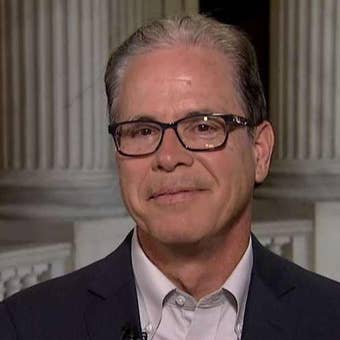Biden admin 'pouring fuel' on inflation fire: Brenberg
Fox News contributor and The King's College Executive Vice President Brian Brenberg analyzes the impact of Biden policies on inflation
Estimating what a piece of legislation will cost is more of an art than a science in our nation’s capital.
While appraisals of the bipartisan infrastructure package’s price have hovered around $550 billion, Sen. Joe Manchin, D-W.Va., revealed the true price tag of the deal last week: $5 trillion, and a fundamental change in Americans’ relationship to their government.
"I would say that if the bipartisan infrastructure bill falls apart then everything would fall apart," Sen. Manchin told reporters on Capitol Hill last Monday. "If one falls apart, how do you do the other one?"
Though many Republicans have tried to delink the two proposals, for Democrats they remain as President Biden first described them: inextricably intertwined.
SEN. BARRASSO ARGUES SPENDING BILL PRICE TAG WILL BE 'MUCH HIGHER' THAN WHAT DEMS ADMIT
Senate Majority Leader Chuck Schumer, D-N.Y., has repeatedly spoke of these two bills as one in the same. House Speaker Nancy Pelosi, D-Calif., has gone so far as to say that the House of Representatives will not vote on one without the other.
Senate Budget Committee Chairman Bernie Sanders has confirmed that Senator Manchin’s axiom works both ways: No reconciliation bill, no infrastructure package.
Democrats in Congress and President Biden are building an inflation bomb with their unprecedented deficit spending proposal, and the Republicans falling for this infrastructure bait-and-switch are lighting the fuse.
BUTTIGIEG SAYS INFRASTRUCTURE BILL WILL AFFECT ‘EVERY AMERICAN’
And though Sen. Kyrsten Sinema, D-Ariz., has stood up to say that Democrats $3.5 trillion estimated price is too high, it doesn’t matter if the final number is $2.5 trillion or $1 trillion. We don’t have the money, and the taxes it’ll take to get it will hobble our recovering economy.
There are also serious problems with the bipartisan infrastructure framework itself.
Following $4 trillion of bipartisan COVID relief spending last year and a $1.9 trillion liberal shopping spree marketed as COVID relief this year, I believe now is the time to cut up the credit card, not put another half trillion of new spending on it.
Infrastructure is great when it’s paid for, and it’s not clear to me that some of the so-called "pay-fors" in the package will even pay for themselves.
LIZ PEEK: BIDEN WRONG ON INFLATION – PRESIDENT IGNORING THESE REALITIES AMERICANS SEE EVERY DAY
Repurposing unused COVID relief funds should absolutely take the place of new spending, especially now that government intervention has become more of a weight on the economy than a boon. But repurposing money we borrowed in the first place isn’t quite a pay-for.
The bill anticipates receiving a large amount of funding from recouping fraudulently-paid enhanced federal unemployment payments. Much like the "tax-gap," estimates for how much fraudulent unemployment insurance was paid out and how much can be recouped is conjecture.
Repurposing money the federal government previously wasted shouldn’t count as paid-for.
This bill anticipates $49 billion in "savings" from delaying the implementation of President Trump’s Medicare Part D rebate rule. Raising drug prices on seniors shouldn’t be a pay-for, it’s just wrong.
More from Opinion
The bill estimates $8.7 billion from the mandatory sequester, which is unlikely to materialize considering these sequesters never get done because Congress doesn't follow any of our own budget rules.
And while I’m glad to see the Congressional Budget Office using dynamic scoring to incorporate return-on-investment for infrastructure spending in its cost estimates for the bill, which they previously would not apply to the increase in revenues we were expected to reap due to a hot economy spurred by the Tax Cuts and Jobs Act of 2017, the 33% ROI estimated by this framework appears to be based on little but wishful thinking.
CLICK HERE TO GET THE OPINION NEWSLETTER
The $550 billion of spending proposed in this bill sits on top of our baseline spending which is already not paid for. The Highway Reauthorization has a $100 billion deficit that has been ignored, and the real pay-fors in this package should be going to address that shortfall.
There is much in this bill that concerns me, but those issues shrink in comparison to the $5 trillion beast looming on the horizon.
Democrats are going for broke with their partisan overhaul of Americans’ relationship to their government. They see this reckless taxing and spending spree as their last chance before the midterm elections to pave the next stretch of road between the United States as we know it and the far left’s socialist goals.
It’s not clear at the moment what all will be in the Democrats’ budget reconciliation monstrosity, but we know their intent: a several trillion-dollar injection of federal government into every aspect of our lives and economy.
And we know what the effect will be: more of the federal government working against businesses who desperately need labor, and more debt spending yielding more inflation.
CLICK HERE TO GET THE FOX NEWS APP
As a representative of the crossroads of America and a former head of a distribution and logistics company, I know the importance of strong roads and bridges better than anyone.
But infrastructure investment is not worth the debt if it’s not really paid for. So long as Democrats are intent on sending us further down the road to socialism, runaway inflation, and more labor shortages, it’s not worth paving the way there.




